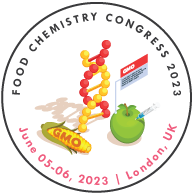Cheng Chun Lo
National Chiayi University, Taiwan.
Title: Optimum baking and infusion conditions for making black soybean tea
Biography
Biography: Cheng Chun Lo
Abstract
Black soybens (Glycine max L. Merr.) were used as raw materials to make black bean tea through porper baking and infusion conditions. Response surface methodology (RSM) based on three-levels-three-variables BoxBehnken design was used to search the optimum condition. The selected variables were baking temperature (90, 120, and 150oC), baking time (1, 2, and 3 hr), and infusion temperature (80, 90, and 100oC). The optimum baking temperature and time was estimated as 108 oC for 1.54hr and the optimum infusion temperature was 100 oC for 10 min to obtain high total phenol content, total flavonoid content, and total anthocyanin content. We used the optimum baking condition to prepare black soybean and infusing the bean in 100 oC water for 10 min, then, picked up the bean and repeat the infusing process again. The total phenol content in the second tea infusion was about 48% of the content in the first infusion, while the percentage was 22% for total flavonoid content. Our data indicated that there are substantive amount of valuable functional ingredients in the second infusion. When consumers take this kind of tea bag products, they often just enjoy the first tea infusion and then throw away the bean left over; thus, it is suggested that consumer may want to take the second tea infusion in order to increase the uptake of antioxidant from black soybean tea products.

